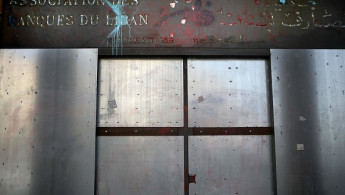Lebanon: Banks' association announce 'indefinite' closure due to 'absence of security guarantees'
Lebanese banks will remain shut for the foreseeable future following a string of raids last week by depositors demanding to retrieve their money amid the country’s financial collapse.
The Association of Banks in Lebanon announced in a statement on Wednesday that bank doors would remain shut "indefinitely" in light of continuing "risks" facing employees.
بعد اجتماعات مكثفة، جمعية_مصارف_لبنان تعلن ابقاء ابوابها مغلقة قسريا حتى الحصول على تطمينات من قبل الدولة ولتفادي المخاطر المحدقة بموظفي #المصارف#لبنان pic.twitter.com/pr33buQC3S
— Association of Banks in Lebanon - ABL (@ABLLebanon) September 21, 2022
The association said they had not receive the appropriate security guarantees from authorities.
"As a result of contacts made by the association with the relevant authorities and because of the risks that still befall bank employees and their customers...the banks will keep their doors closed at the present time, especially in the absence of any measures or even reassurances from the state and all security agencies in order to ensure a safe working environment," the statement said.
Banks were supposed to close for three days and reopen on Thursday.
Several banks were stormed on Friday by angry depositors demanding they access their money, some armed. While some customers managed to retrieve some of their assets, others did not.
It follows similar hold-ups earlier last week and last month.
Politicians, including Interior Minister Bassam al-Mawlawi, condemned the raids, saying it "opened up the door to further chaos."
But there was a large outpouring of support for the depositors, with most people applauding them.
Lebanese banks froze savings accounts during the country's 2019 financial crisis and have since maintained strict withdrawal limits – in effect causing millions of Lebanese to lose their savings.
Since the economic meltdown began, a large portion of Lebanese have been thrust into poverty, and essential services such as electricity and healthcare have been severely degraded.
The crisis has been largely blamed on decades of gross mismanagement and rampant corruption by the ruling elite.
The government has not yet decided on a financial recovery plan, as the International Monetary Fund on Wednesday said the slowness to implement desperately needed reforms was exacerbating the country's economic meltdown.





 Follow the Middle East's top stories in English at The New Arab on Google News
Follow the Middle East's top stories in English at The New Arab on Google News
![The UAE is widely suspected of arming the RSF militia [Getty]](/sites/default/files/styles/image_330x185/public/2024-11/GettyImages-472529908.jpg?h=69f2b9d0&itok=Yauw3YTG)
![Netanyahu furiously denounced the ICC [Getty]](/sites/default/files/styles/image_330x185/public/2024-11/GettyImages-2169352575.jpg?h=199d8c1f&itok=-vRiruf5)
![Both Hamas and the Palestinian Authority welcomed the ICC arrest warrants [Getty]](/sites/default/files/styles/image_330x185/public/2024-11/GettyImages-2178351173.jpg?h=199d8c1f&itok=TV858iVg)